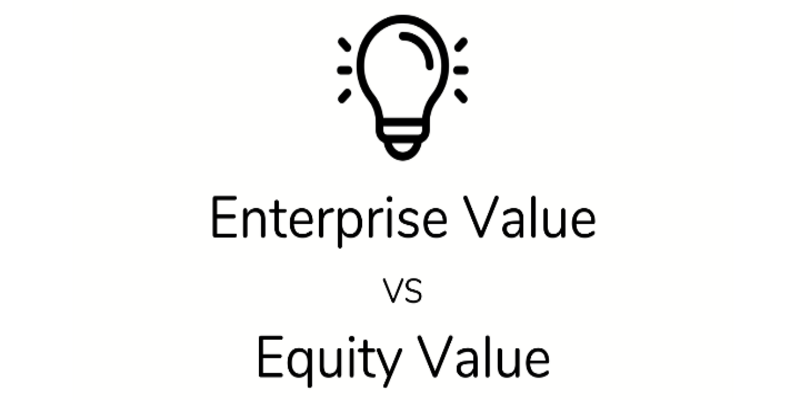We explain the distinction between a company's enterprise and equity values. Expressed, the equity value is the overall value of a company that is attributable to its shareholders. In contrast, market capitalization is a company's total worth without considering its capital structure. Find out all there is to know about Business Valuation vs. Stock Market Value. When a company is acquired or merged with another, its worth is often determined by its enterprise vs equity value. Both may be helpful when trying to determine a company's worth or sell it, but they do it from significantly different perspectives. Equity value provides a snapshot of a company's present and possible future worth. In contrast, enterprise value provides an accurate measurement of the absolute current value of a corporation, akin to a balance sheet.
When valuing or selling a company, enterprise value and equity value may be employed, although they provide significantly distinct perspectives. A firm's enterprise value is determined by adding market capitalization (or "market cap") to the entirety of the company's debts. Enterprise value is added to non-core assets, and after deducting debt as well as cash on hand, the result is equity value.
Enterprise Value
Business worth is made up of more than simply shareholders' equity. In theory, knowing a company's value helps make comparisons across businesses with various capital arrangements, as the value of a firm is independent of its capital structure. An acquirer must take on all of the acquired company's debt and the cash it has on hand. The cost to acquire the firm rises if you take on its debt but falls if you pay for it with cash. A firm's enterprise value is determined by adding current market capitalization (or "market cap") to all of the company's debts. Interest owed to shareholders, preferred stock, and similar obligations all count as debts the corporation owes. You may calculate a company's enterprise value by subtracting its current cash and cash equivalents from its total current assets.
The Importance Of Enterprise Value
There are two ways for bankers to value a company using a discounted cash flow (DCF) model: either they valuation the enterprise while also projecting cash inflows to the corporation and discounting one another by a weighted average capital price (WACC), or they value this same equity directly by superimposing free cash flows to existing shareholders and discounting one another by the cost of equity. By having a firm grasp of the distinctions between the two valuation methods, you can avoid any inconsistencies in your calculations of free cash flows and discount rates.
Equity Value
Owner's equity is the monetary worth of their stock in the firm and any loans they have provided. Equity value is determined by subtracting total debt minus cash on hand from the market valuation of non-operating assets. Either value of shareholders' loans or the value of ordinary and preference shares outstanding may be subtracted from the total equity value. "market capitalization" and "equity value" are sometimes used interchangeably. However, there is a significant distinction between the two: market valuation only takes into account the value of the equity shareholders of a corporation. Debt includes both preferred stock and stockholder loans. In contrast, these assets are included in the equity value. Equity value is derived in the same way as enterprise value. Still, it also factors the worth of a company's stock options, convertible instruments, and other prospective assets or liabilities.
Equity Value Vs. Enterprise Value
Enterprise Worth, in its broadest sense, is the value of a company as determined by several financial metrics. After deducting things like cash, debt, and working capital, Equity Value is the amount a buyer would pay to a seller for a firm. Typically, a prospective buyer will express interest in purchasing a company based on its Enterprise Value, with the purchase price settled via the Equity Value.
Conclusion
Even amongst recently employed investment bankers, there exists a common misunderstanding between Enterprise Value and Equity Value. To accurately construct valuation models, knowing the difference between free cash flows (FCFs) and discount rates is essential. For a merger or acquisition, a company's worth is often calculated using both its enterprise and equity values. It's possible to use either one in a company sale or valuation, but they both have their perspective. Enterprise value, in contrast to equity value, which provides a glimpse of both present and potential future worth, is a precise estimate of the overall current worth of a corporation, similar to a financial statement or a balance sheet. In contrast, owners and present investors often use equity value to estimate the company's potential.

What Is The Difference Between Equity Value Vs. Enterprise Value

Convertible bond premium

The Best Stocks To Buy In Semiconductors

Every Detail About: How REO Agents Work

Tips to Pay off Mortgage in 5 Years

CDs vs. Bonds: What is the Difference

Explain Loan Servicing?

Review of H and R Block 2023

How Long Does It Take a Mobile Deposit to Clear

Betterment Vs. Fidelity Go: Which Is Better For You?

The Stable Value Fund: What Is It


